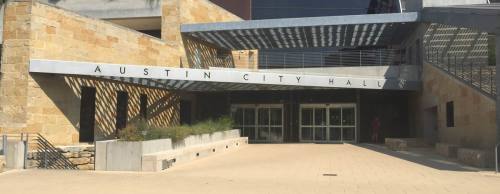Austin City Council agreed to lessen restrictions on accessory dwelling units, or ADUs, during its Nov. 19 meeting after about three hours of debate.
ADU units have also been called two-family residential units, secondary apartments, granny flats and garage apartments.
Changes approved by council allow ADUs to be located 10 feet from each property's main home instead of 15 feet as currently required by city law. Also, the minimum lot size required to build an ADU has been reduced from 7,000 square feet to 5,740 square feet, and the structure cannot be larger than 1,100 square feet.
Protections were also passed to prevent ADUs from being used as Type 2 non-owner occupied
short-term rentals, or STRs. New law also prevents secondary units from being
rented as STRs more than 30 days per year.
Driveways are no longer required to build a secondary unit, and as long as the property is located less than or equal to .25 miles from an activity corridor with bus or transit routes then no parking spot is required. Only units farther than one-quarter of a mile away from those corridors would be required to have one parking spot. Front-yard parking would no longer be banned.
The ordinance applies citywide, with the exception of areas zoned single-family standard lot, or SF-2, and single-family large lot, or SF-1.
Proponents of the changes said ADUs could be used as a tool to tackle Austin's affordability crisis, and opponents expressed concern about preserving neighborhood character and allowing code changes that may override some neighborhood plans.
“For progressives, that’s a really big sell for allowing accessory dwelling units that you can have different people of different economic means getting to enjoy our greatest neighborhoods,” said District 4 Council Member Greg Casar, who helped lead efforts to enact the changes.
District 3 Council Member Pio Renteria said his community fought against pushback from Austin Neighborhood Council to develop ADUs in his area. New secondary units helped create new income for struggling families, kept others in their homes and created a diverse community of varying income levels and ethnicities, Renteria said.
Some council members voiced concern the changes should wait until the city's land development code is revamped during the CodeNEXT process, otherwise unintended consequences could come from the changes, which cause more community issues.
”Once this genie is out of the bottle, we can’t fix it,” District 1 Council Member Ora Houston said. She voted against the approved changes, as did Mayor Pro Tem Kathie Tovo of District 9 and Council Members Ann Kitchen of District 5 and Leslie Pool of District 7.
Responding to concerns that the majority of neighborhoods may not want ADUs, District 2 Council Member Delia Garza said if a majority of homeowners do not want ADUs then they will not likely develop one on their lot.
Casar said the approved changes can also serve the neighborhood interest of property rights.
“For folks that are interested in property rights … the idea that you are allowed to build an extension to your house, but you aren’t allowed to put a door on it and kitchen in it seems very confusing. So I think … regardless of whether you’re a progressive or someone who’s more focused on property rights, this is a common-sense move."




